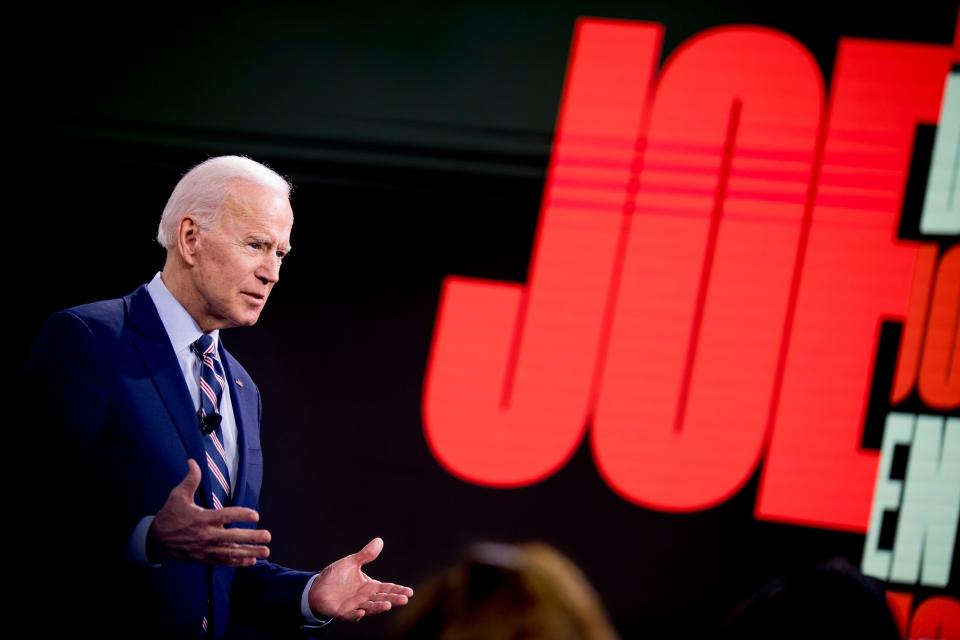Biden could be transformative if he pledges to serve only one term and fix fundraising
Joe Biden leads in the national polls to be the Democratic nominee for president. But with less than two weeks before the first votes will be cast and tallied, the former vice president seems stuck at around 25-30% support.
One thing holding Biden back has been the idea that he is too old to be president. If he wins, he’ll be 78 when he takes office, far older than any president in a first term has ever been.
But Biden has an easy way to not only minimize this criticism but also to win additional support from so many who are frustrated with the corruption of our political system: Publicly pledge that if elected, he would serve only one term. This would permit him not only to neutralize those who worry that he’d be running for a second term at age 81 (!), but also to signal something even more important: that he can be a politician who actually governs and is not always raising money from large donors.
Last month, Politico reported that Biden has signaled to some aides that he would likely only serve one four-year term. But he has not made a public promise to that effect. Hillary Clinton’s 2016 campaign chairman, John Podesta, told Politico such a pledge would be a “weak play.”
One-term pledge would be liberating
But Biden could show strength by turning a one-term pledge into a meaningful promise of independence from the constant, corrupting fundraising and campaigning that so many Americans of both parties despise. For instance, large majorities of Americans favor term limits for members of Congress, because they don’t like politicians thinking more about raising money for tomorrow than for governing today.
That’s a real concern: Members of Congress spend enormous amounts of time fundraising when they could use that time to solve problems or meet with constituents.
And, of course, the ever-increasing price tag to run for office only makes politicians more responsive to the wishes of the few big donors who write the biggest checks. The losers here are average folks, because as politicians become increasingly dependent on a few elite donors, they necessarily become less responsive to the needs of citizens at large.

Consider what a contrast this strong pledge would create with President Donald Trump. Remarkably, Trump filed the paperwork for his reelection on the very day he was inaugurated, and he first spent money on his 2020 campaign before he was sworn in.
We all know what that meant: raising immense amounts of money from the same wealthy donors whom Trump promised to be independent of, including by holding dozens of fundraisers in his first two years in office, when reelection was far away.
Is it any wonder, then, that Trump has done things like assist megadonor Sheldon Adelson with an effort to build a casino in Japan? Since Trump is always in campaign mode, he’s always engaged in the kind of legalized corruption so many voters of both parties despise.
Money talks: Obama was right, Alito was wrong: Citizens United has corrupted American politics
Now imagine how Biden could frame a one-term pledge as a sign of strength. Without a reelection to worry about, Biden could close his campaign offices the day after he’s elected. He could promise that he’d get to the hard work of governing for the benefit of all Americans rather than for the benefit of big donors. And he could credibly say he would never take a check from a donor ever again.
Trump said he wanted to drain the swamp and has failed to deliver, perhaps because he keeps wading into the swamp to collect big checks. But Biden could turn his back on all that and just worry about governing.
No-fundraising pledge would be bold
In fact, Biden could go one better than a one-term pledge and make an even bolder promise: not to do any fundraising while in office. Even when presidents are not raising money for their own campaigns, they can still be busy asking for checks for their party, for Senate races, House races and more. President Barack Obama held dozens of fundraisers in his last years in the White House for the Democratic Party and Democratic candidates. He was the fundraiser in chief even though he could not run for reelection.
By Biden:Worse than even his policies, Trump is destroying America's soul
If Biden gives up fundraising while president, he could be the leader who finally fixes our system so that others, too, can run campaigns that are not overly dependent on wealthy donors and special interests. He has promised, for instance, to push for public campaign financing and overturning the Supreme Court's Citizens United ruling. Without the need to constantly please wealthy donors, perhaps he can create the political space to push these through.
The bottom line is that Joe Biden’s age can be an asset — if he plays it correctly. He has the stature and experience to become the first president in decades to do the one job he’s elected to do: govern, and govern to “promote the general welfare,” as the Constitution commands. He can serve one four-year term, do it as well as it can be done, and let the next generation do the fundraising.
After all, this year, Joe celebrates his 50th anniversary of first serving in elected office. Wouldn’t that be a perfect time to stop asking people for more money for the next election?
Jason Harrow is a Los Angeles attorney who is executive director and chief counsel of EqualCitizens.US
You can read diverse opinions from our Board of Contributors and other writers on the Opinion front page, on Twitter @usatodayopinion and in our daily Opinion newsletter. To respond to a column, submit a comment to letters@usatoday.com.
This article originally appeared on USA TODAY: Biden should make one-term pledge: Full-time governing, no fundraising

